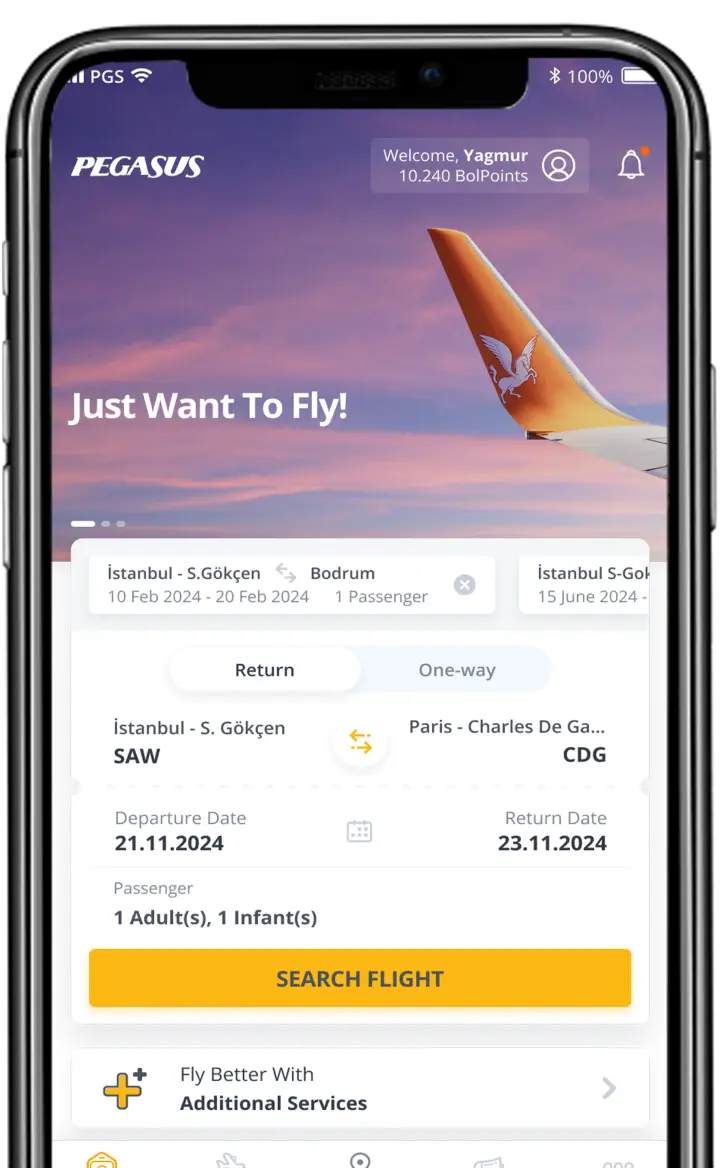
Our 2050 Net Zero Carbon Emissions Journey
Since 2015, we've been providing ground operations services for our aircraft at Istanbul Sabiha Gökçen Airport.
With our new generation electric vehicles that complement our modern fleet, we're advancing towards our Net Zero 2050 carbon emissions goal and moving towards a sustainable future.
Pegasus Airlines Climate Transition Roadmap
We have been measuring and reporting on our carbon emissions since 2015.
As a low-cost carrier, with a business model focused on cost control and efficiency, we have been investing in initiatives to significantly reduce our fuel consumption and carbon footprint for over a decade.
In 2021, we joined other leading airlines of the world to commit to the “2050 Net Zero Carbon Emissions” set at the 77th Annual General Assembly of the International Air Transport Association (IATA). Under the motto “Fly Net Zero” we commit to reaching net zero carbon emissions by 2050.
We group four sets of actions that will help us to achieve our Net Zero Carbon Emissions target in 2050, on New (Aircraft) Technology, on Operational Efficiency, on Regulatory Offsetting and on Sustainable Aviation Fuels (SAF) (including Low-Carbon Aviation Fuels (LCAF)).
Our Climate Transition Roadmap lays out contribution of each set of actions to our target, on a trajectory beginning in 2016, when we received our first new generation Airbus NEO aircraft, and extending into 2050. The Roadmap is presented with key assumptions. It is also complemented by potential upsides for and risks to current projections. Realization of these and other factors may necessitate changes in our current projections.
Our main emissions reduction action until 2035 is our fleet transformation, providing the most tangible emissions-reduction action currently available, as we manage an above-industry growth. Through further clarity on SAF/LCAF availability and pricing, energy transition is expected to overtake fleet & operational actions as the main driver for our Net Zero Target. In addition, we plan to achieve our target with the actions we have already taken and continue to develop in terms of our plans on operational efficiency and industry-endorsed offsetting under International Civil Aviation Organization’s CORSIA Scheme.

Key Assumptions
- New generation Airbus NEOs represent 80% of fleet end of 2023
- 20% fuel efficiency on NEO fleet
- Operational actions contribute 2-5% p.a. (including fuel, ground ops & premises)
- Air Traffic Control efficiency taken as 3% in average as per Global IATA assumption
- Only CORSIA offsetting assumed
- Assumes current EU ReFuel mandate
- Assumes Turkish SAF draft mandate and projects increase towards 2050
- Voluntary SAF limited until 2035, given current limitations on supply and pricing
- With increased SAF offtake, absolute emissions abatement begins in 2035
Notes to Our Climate Transition Roadmap
Upside Opportunities:
New (Aircraft) Technology
- Improved fuel efficiency on aircraft, unlocking fuel savings beyond today’s 20%.
- Commercial availability of next generation hydrogen aircraft with no/minimal emissions.
Operational Efficiency
- Air Traffic Control and route efficiencies beyond the average 3% assumed as per the IATA global estimate.
- Unlocking new fuel saving initiatives with higher total fuel impact through the monitoring and development of flight processes.
- Wider availability of renewable energy technologies in airport operations.
- Further energy efficiency gains in airport operations and use of premises through better consumption monitoring and control.
SAF (including LCAF)
- Lower spread between Jet A1 Fuel & SAF/LCAF prices.
- Recognition of carbon capture as a viable tool for Net Zero Target, unlocking a competitive abatement measure for SAF/LCAF.
- Synthetic SAF becoming widely available before 2036. This will increase SAF abatement impact from 80% to 100% of equivalent JetA1 Fuel.
Downside Risks:
GHG Methodology
- New GHG components, e.g., contrails and increasing emissions scope.
Regulatory Offsetting
- New ETS schemes and taxation measures beyond global CORSIA offsetting standards.
SAF (including LCAF)
- Lack of supply for industry SAF requirements and feedstock.
- Inability to fully benefit from the Book & Claim mechanism across different jurisdictions (allowing for using SAF/LCAF claims for products purchased in other jurisdictions and consumed by another carrier).
- Higher spread between Jet A1 Fuel & SAF/LCAF prices.
- Infrastructural bottlenecks preventing efficient access to and use of SAF/LCAF.



